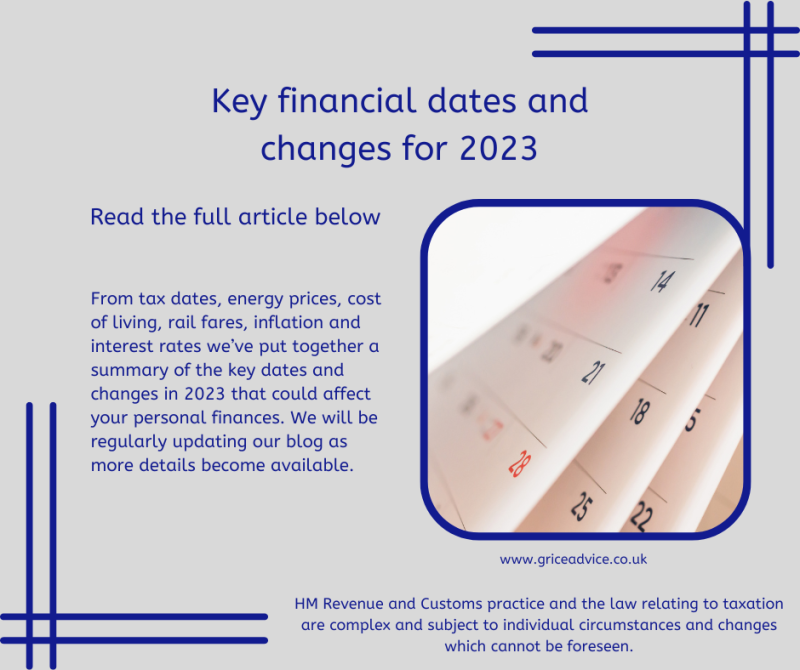Key financial dates and changes for 2023
Posted by Nigel on Monday 30th of January 2023.

From tax dates, energy prices, cost of living, rail fares, inflation and interest rates we’ve put together a summary of the key dates and changes in 2023 that could affect your personal finances. We will be regularly updating our blog as more details become available.
January
31st Tax return deadline
Self assessment tax returns for tax year 2021/2022 must be filed AND the first payment made.
March
5th Rail fare rise
This year’s rise has been pushed back from January to March, with fares rising by up to 5.9%
15th Spring Budget
Chancellor Jeremy Hunt will detail his financial plan for the coming year.
31st Help to buy deadline
The scheme designed to help buyers with a 5% deposit get on the property ladder draws to a close. All purchases under the scheme MUST have completed by 31st March.
31st Energy discount ends
As things stand, the £400 rebate on energy bills will end, there are no current plans to extend.
April
1st Energy Price Guarantee rises
The Energy Price Guarantee will increase from £2,500 to £3,000 for a typical household. It is important to note that this isn’t the highest amount you could pay on your energy bills. Simply put, if you use less you will pay less, use more you will pay more.
1st Council tax bills go up
For the first time the average council tax bill is set to exceed £2,000 per year. Councils have had the 3% increase cap removed, allowing them to increase by up to 5%, with the additional 2% for social care.
1st Water bills could rise
New rates for water bills will begin on April 1st, The water regulator, Ofwat, has told some suppliers to reduce bills customer due to missed targets on pollution and water supply targets.
1st Prescription charges?
Prescription charges were frozen for 2022/2023 for the first time in 12 years, it’s not yet been confirmed whether the freeze will remain in place.
5th End of the tax year
The day before all your tax allowances reset. Have you made use of all your allowances for the year?
6th Tax Changes
Following on from Jeremy Hunt’s autumn statement, this is the day that his announced tax changes will take place.
10th State Pension and benefits rise
The reintroduction of the triple lock means that state pension will rise by 10.1%, this means the full state pension will increase from £185.15 to £203.85 per week, and the basic from £141.85 to £156.20 per week.
Benefits will also rise by 10.1% meaning the standard allowance for someone single and under the age of 25 will rise from £265.31 to £292.11. Those with a joint claim, where one or both parties is over 25, will receive £578.82, and increase from £525.72.
July
31st Stamps deadline
Traditional, non barcoded stamps will no longer be accepted, you can however still use commemorative and non barcoded Christmas stamps.
31st Payment on account deadline
If you file a self assessment tax return, your second payment will now be due
October
31st Paper tax deadline
If you file a paper self assessment tax return, the deadline is October 31st. You face fines if you don’t meet the deadline.
November
Energy help
While there is no specific date for this, it is expected that within November the Winter Fuel Payments of up to £300 will be paid out (age, location and benefit status dependant)
Inflation
The Office for National Statistics releases inflation figures on a monthly basis, this year’s expected dates are:
|
January 18th |
February 15th |
March 22nd |
April 19th |
|
May 24th |
June 21st |
July 19th |
August 16th |
|
September 20th |
October 18th |
November 15th |
December 20th |
Interest rates
The Bank of England (BoE) base rate is currently at 3.5%, this was just 0.1% in December 2021, it has been raised nine consecutive times over the last year.
The Monetary Policy Committee meets eight times a year to discuss whether to adjust the BoE base rate. The expected dates for 2023 are:
|
February 2nd |
March 23rd |
May 11th |
June 22nd |
|
August 3rd |
September 21st |
November 2nd |
December 14th |
Cost of living payments
Over the coming year there are expected to be more rounds of cost of living payments, as with 2022 these will be linked to those on certain means tested benefits.
State pension age
The next review into the state pension age is expected early this year. It is currently 66 and is expected to rise to 67 by 2028.
HM Revenue and Customs practice and the law relating to taxation are complex and subject to individual circumstances and changes which cannot be foreseen.
Approved by the Openwork Partnership on 30th January 2023
Please note: by clicking this link you will be moving to a new website. We give no endorsement and accept no responsibility for the accuracy or content of any sites linked to from this site.